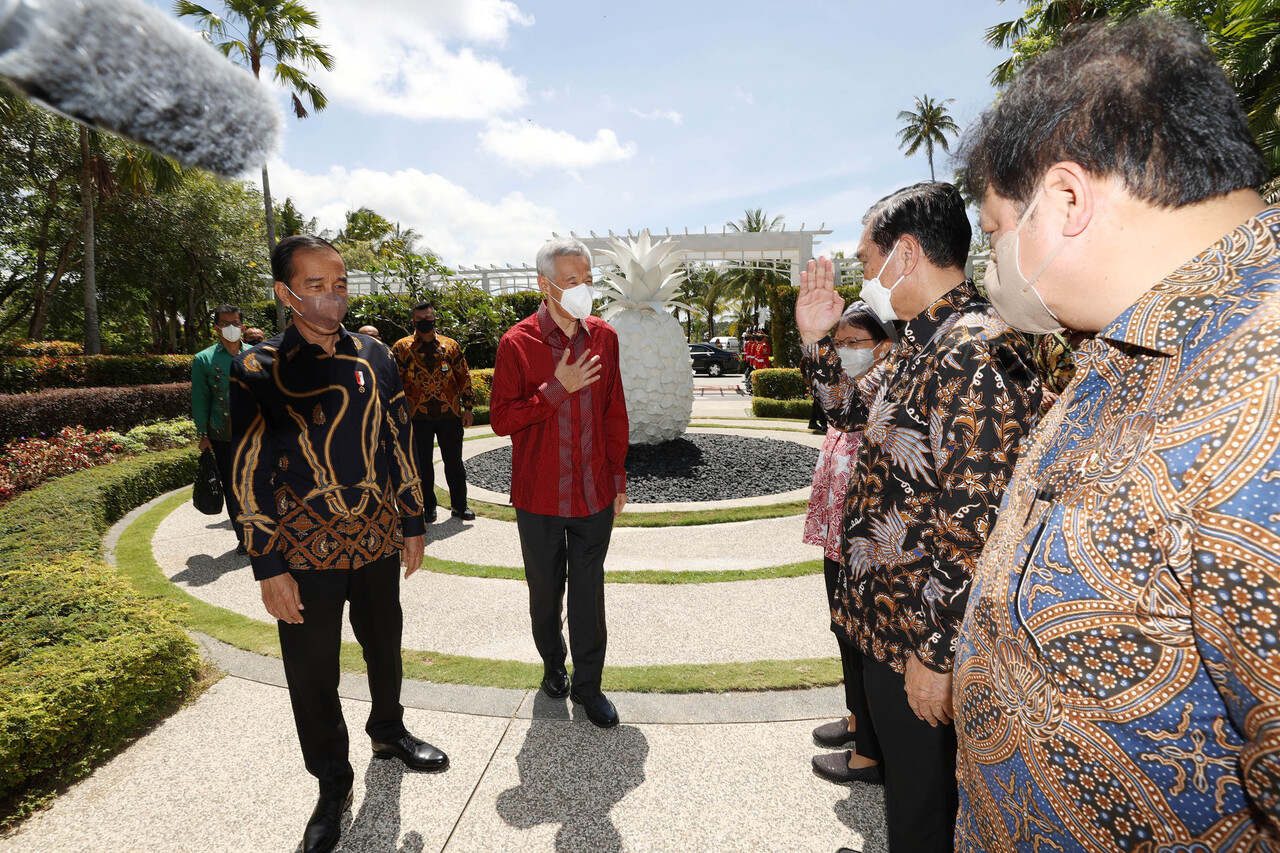S'pore-Indonesia Leaders' Retreat: Indonesians welcome pacts, hope Parliament will see them through
Sign up now: Get ST's newsletters delivered to your inbox

Indonesian officials welcoming PM Lee Hsien Loong in Bintan (centre) as he arrives with Indonesian President Joko Widodo (left) on Jan 25, 2022.
PHOTO: MINISTRY OF COMMUNICATIONS AND INFORMATION
Follow topic:
SINGAPORE - Indonesian media welcomed the landmark agreements announced at the Singapore-Indonesia Leaders' Retreat in Bintan on Tuesday (Jan 25) and praised President Joko Widodo's government for its commitment in resolving longstanding bilateral issues.
In a commentary, Mr Kornelius Purba, a senior editor at the Jakarta Post, described the signing of the agreements on defence cooperation, extradition and flight information region (FIR) as "historic".
But he also cautioned Indonesians against hubris, noting that the agreements were reached on the basis of mutual benefit for both sides.
"It is not difficult to conclude that for many, if not most, Indonesians, the signing of the agreements was a triumphant moment for Indonesia," he wrote. "For too long, they might contend, Indonesia had kept a low profile just for the sake of Asean unity.
"The summit in Bintan was, from this perspective, a long-awaited victory of a big nation over its much smaller neighbour, which had tried to take advantage of it," he added. "However, we should look in the mirror. We Indonesians rarely ask ourselves what is wrong with us. Size does matter, but it is not everything."
He said while Indonesia is the largest member of Asean, it has no right to demand respect from others when it fails to respect them.
Indonesia and Singapore depend on each other and their relationship is based on mutual benefit, he added.
"Of course, we must fight for these benefits, rather than asking for a fair share merely because Indonesia is a big brother of Singapore," he said.
A separate news article in the Jakarta Post said the set of agreements might put pressure on Indonesian lawmakers to ratify them all at once.
Both countries had signed the Defence Cooperation Agreement and extradition treaty in 2007 under the administration of President Susilo Bambang Yudhoyono, but the deals were not ratified by Indonesia's Parliament as lawmakers objected to the defence pact.
Prof Hikmahanto Juwana, a professor of international law from the University of Indonesia, was quoted as saying that the two deals faced significant public opposition at the time, prompting the government to not submit them to Parliament.
If the House fails to ratify the documents this time, Indonesia could effectively again lose the right to manage its airspace, Prof Hikmahanto warned.
An editorial broadcast on local TV station MetroTV said the extradition treaty was a "second attempt at concretising" the 2007 agreement by Dr Yudhoyono.
"Now, the fate of the extradition treaty is again in the hands of the DPR," it said, using the acronym for the House of Representatives.
But with President Widodo's coalition controlling 82 per cent of the 575 seats, political opposition would be small and there should be "no problem" for the House to ratify the agreements, noted Mr Eko Rahmawanto, an editorial board member of the station's media group.
He said Indonesians should "be appreciative that the current government has demonstrated its commitment to resolve unfinished business".
Former Indonesian Air Force chief of staff Chappy Hakim, who had long been critical of existing FIR boundaries, lauded the FIR agreement in a Kompas article.
He wrote: "Thank God, finally a president of the Republic of Indonesia can say proudly, 'The scope of the Jakarta FIR will cover all of Indonesia's territorial airspace, especially in the waters around the Riau Islands and the Natuna Islands."

